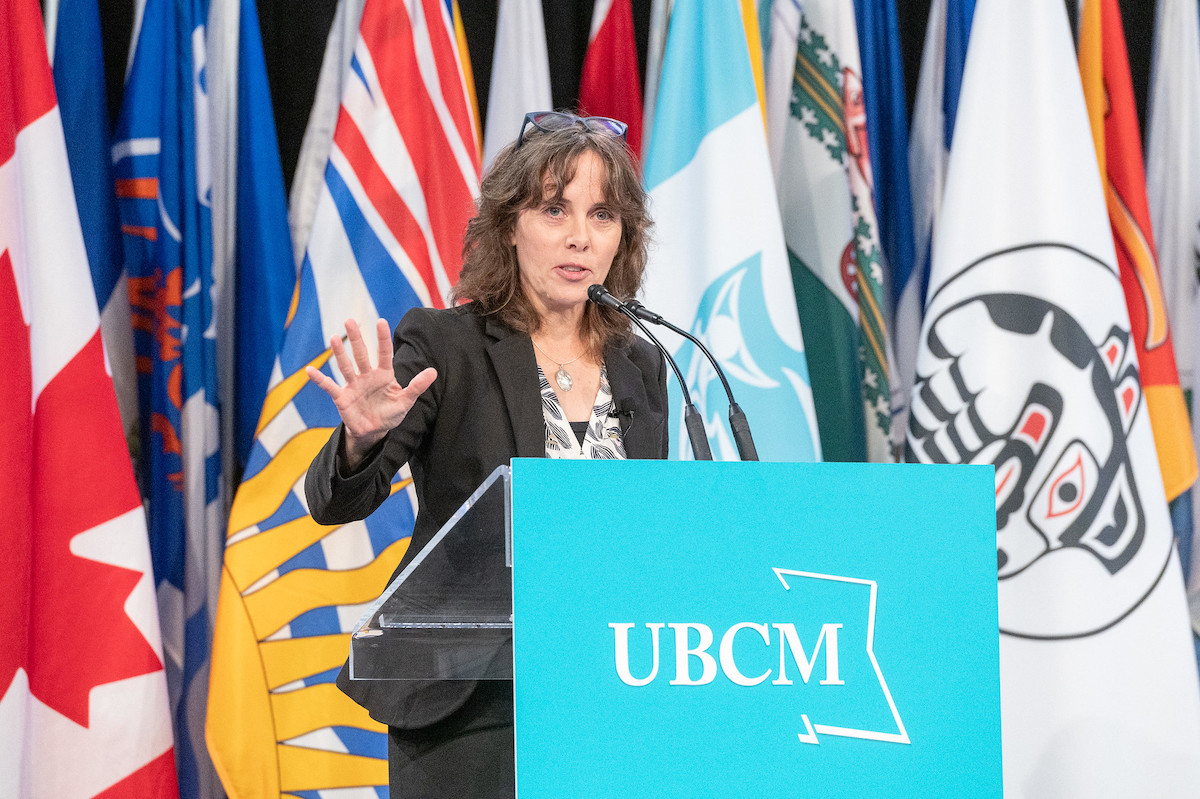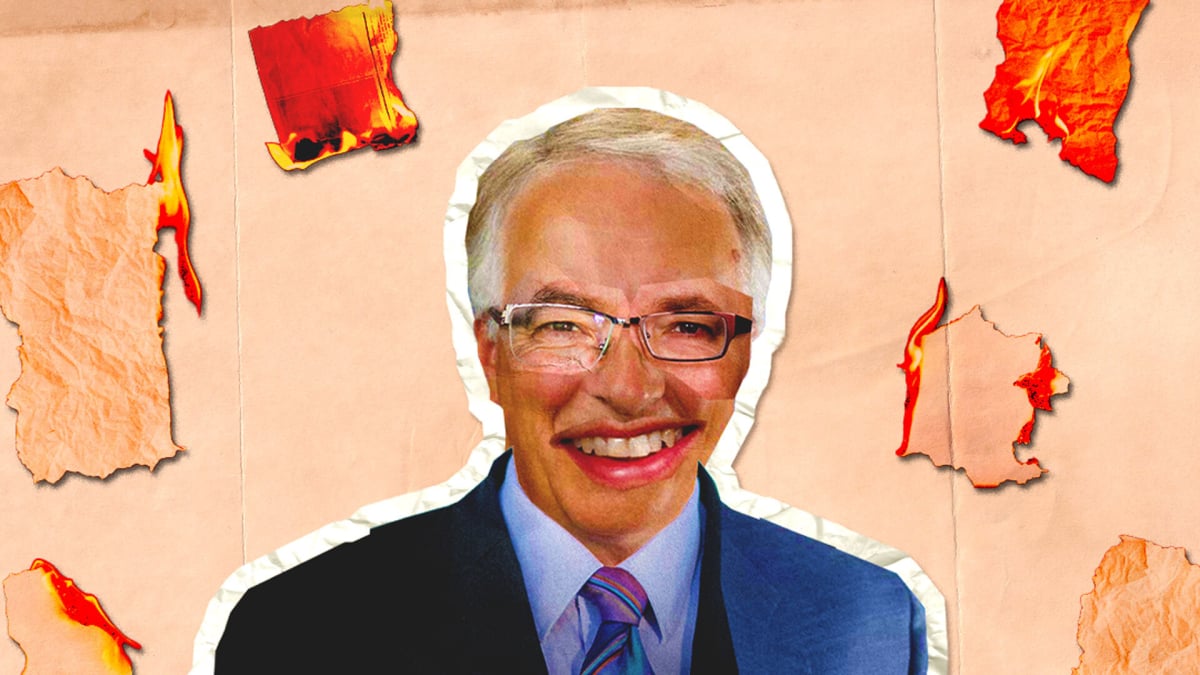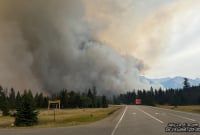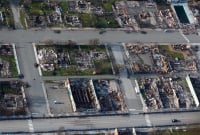Support strong Canadian climate journalism for 2025
John Rustad, the 19-year political veteran who has revived the Conservative Party of B.C. and is surging in the polls, has a long history of doubting climate science and the need for climate action, going so far as hinting that climate policies are a plot to control people.
In dozens of speeches, comments and social media posts, the 61-year old MLA from northern B.C. has consistently questioned if humans cause global warming and criticized efforts to tackle the crisis. He has been clear that if elected premier, he will undo many of the province's key climate policies, first and foremost the province’s carbon tax.
In his first set of interviews after vanquishing the B.C. United Party, his main conservative opponent, Rustad addressed concerns about his climate record head-on.
"Humans have contributed to climate change, yes," he said in a prime-time interview with CBC. "[But] it is not at a crisis level, there are many things that are far more important. When people can't put food on the table, that's a big issue."
Questioning climate science, in a certain sense, is what got Rustad where he is today. In 2022, he was booted from the B.C. United party — at the time, the B.C. Liberals — for questioning climate science and boosting false, conspiratorial claims about the problem. The B.C. Liberals were national climate policy leaders, responsible for establishing Canada’s first carbon tax.
Rustad's expulsion set him on his current political path, giving him the freedom to make his promise to eliminate B.C.'s carbon tax key to his campaign platform, despite federal rules which would prevent him from scrapping carbon pricing entirely.
"People are tired of being broke, they're tired of the cost of living, they're tired of taxes," said Trevor Bolin, the B.C. Conservative Party's former leader and municipal councillor in Fort St. John. The party’s appeal lies in its promise to reduce taxes and axing other major provincial support programs to "get back to smaller government."
Polling by Pallas Data released Friday found that if an election was held on Thursday, Aug. 29th, 43 per cent of respondents would have voted for the B.C. Conservatives, while 44 per cent would give their vote to the NDP.
But with a provincial election only six weeks away, Rustad is entering a much more risky phase of his political rise: facing the public with a more intense spotlight on him than ever before. His murky climate positions, at odds with the overwhelming majority of scientists in an era of nonstop climate disasters, could be about to transform from an asset into a liability.
Climate conspiracies
In June, Rustad took the stage to speak to the Greater Vancouver Board of Trade before what should have been a friendly audience for a free-market politician. In a staid blue suit and tie, sitting in a too-large wingback chair, Rustad looked relaxed as he delivered his opening remarks.
But as soon as the main event — a live interview — began, the moderator quizzed him on his position on climate. Rustad seized the moment: "Climate change is real," he said. But moments later, he returned to his well-trodden patterns, adding, "the question to the degree of impact to human activity — scientists can debate that, are debating that."
He has even, on occasion, embraced extreme far-right conspiracies about the crisis. Last year, he appeared on the social media platform Rumble with Christian extremist politician Laura-Lynn Tyler Thompson and suggested that this "climate narrative" is part of a conspiracy that "somehow we need to reduce the world population," echoing a conspiracy theory that climate policies are actually part of a plot by a shadowy group of elites to control people.
A year later, in 2023, he liked a post on X/Twitter saying there is "no sign of the global warming crisis" and that the fight against climate change is a "UN campaign that is stage-managed on behalf of rich globalists."
He also has repeatedly doubted the severity of the impacts of climate change — something that has already fuelled record-breaking droughts, floods, fires and cold snaps, costing the province at least $17 billion per year according to an estimate by the Canadian Centre for Policy Alternatives. The situation will dramatically worsen if nothing is done to reduce emissions, climate experts say.
In a May interview with Kelowna Now, Rustad said that "climate issues [are] not an existential threat." He repeated the claim to The Globe and Mail in a June 1 interview, stating that climate change "is not even a crisis."
Taken together, the comments suggest that a Rustad-led province could see a dramatic reversal in its track record of leading climate policy. Yet with intense concerns about B.C.'s soaring cost of living, access to healthcare and the toxic drug crisis driving the current political agenda, Rustad appears to be confident voters will overlook his climate record.
Affordability trumps climate
Political analysts and pollsters trying to understand Rustad's meteoric rise say his appeal has little to do with climate, resting more on the challenging economic situation facing thousands of Canadians.
"John Rustad is not doing well because of his position on climate change. He is doing well because there is a fundamental pocketbook focus for the average British Columbian," said Greg Lyle, president of Innovative Research Group, a market research and polling firm in B.C. and Ontario.
That doesn't mean B.C. residents don't care about the climate: polling from Angus Reid shows 80 per cent of people in the province believe climate change is real, and only a small minority believe it is not caused by humans. The problem, Lyle says, is they are not willing — or able — to pay for the costs associated with fighting the crisis, like higher utility bills associated with building more sustainable infrastructure.
While Canada may not officially be in a recession, most people in British Columbia and Canada are taking home less pay than a few years ago relative to inflation. This "per-capita recession" is exacerbated by the housing affordability crisis, where about 70 per cent of Canadians are struggling to find or afford the housing they want, Lyle said.
Affordability issues have generated a lot of anger towards existing NDP policies on issues from housing to climate, giving Rustad an opening to build popular support for a free-market, right-wing agenda.
Lyle added there is a "pretty broad agreement" among political analysts that the B.C. Conservatives are also receiving a "honeymoon pull" from the rising popularity of the federal Conservatives under Pierre Poilievre, whose agenda also centres on eliminating federal carbon pricing. However, that might shift in the coming weeks as British Columbians become more familiar with Rustad and his party's platform.
"The provincial Conservatives are not the federal Conservatives," he said. "There's room for new information to make a difference in what people think about the provincial Conservative Party."
Exposing the climate skeptic
Rustad's opponents are sharpening their blades to pounce on their rival's climate record and the harm they say he will cause if elected.
Rustad's long history of refuting climate science and attacking climate policies "matters because if that is the starting point of [his] policy and legislative agenda [he] is not going to be inclined to put your policy through a lens of what we need to do in this era," said B.C. Green Party leader Sonia Furstenau.

In 2023, the provincial government reported that its climate policies have generated a net reduction in greenhouse gas emissions of four per cent from 2007 levels, the province's baseline level. Rustad has called the province's climate plan "ridiculous."
Speaking with Canada's National Observer Thursday, current B.C. environment minister George Heyman emphasized that tackling affordability was central to the NDP's policy platform, and the province's climate efforts were part of that push.
Rustad's outright climate skepticism and stated commitment to unraveling the province's climate change policies would exacerbate the costs associated with the climate crisis — without tackling the affordability crisis, Heyman said.
For Rustad's supporters, the NDP government's claim that tackling the climate crisis is key to improving affordability ring hollow.
Bolin, the former party leader, said he believes climate change is a problem and that "we need to live with a softer footprint on the earth." But dealing with the crisis with a carbon tax, increasing protected areas and implementing stricter environmental laws is the wrong approach, he said. Instead, he believes Rustad will "actually go out and talk to industry" to craft environmental policies that meet each region's needs.
"John's done a fantastic job," Bolin said. "It is not easy being a leader of any party and I think it's probably going to get a lot tougher for him going forward."






Comments
I guess Rustad doesn't understand that anthropogenic climate change is a HUGE contributor to the higher cost of food -- plus the corporate profit imperative. Climate change is making it harder to grow crops in many places -- the droughts and floods and extremes of heat and cold and violent storms and the giant hail and other "unseasonable" weather events do interfere with agricultural production. We ought to be able to assume that he could figure that out.
You seem to be assuming that Rustad is well meaning but deluded. Don't. He could be smart, well informed, and evil. Evil does exist, and you can't defend against it without acknowledging that it exists.
Agreed, but we don't seem willing to acknowledge that flat-out stupidity exists either, especially in wannabe "leaders," so this guy could also be THAT, as in "too stupid to come in out of the rain" stupid.
This is a good and important article, BUT re "The problem, Lyle says, is they are not willing — or able — to pay for the costs associated with fighting the crisis, like higher utility bills associated with building more sustainable infrastructure." This is a classic case of repeating a right wing climate delayer's frame, which is one of the multiple reasons it is so hard to get traction on climate action in Canada. There isn't even a note that this is a dubious, at best, claim! Max, please re-read Don't Think of an Elephant! by George Lakoff again and stop undermining the case for climate action.
Good comment. But there is also the long view that indicates the global economy is shifting away from carbon by being based on the low cost and efficiency of mainly solar and wind power.
Make no mistake. I will never direct my personal vote to elect a Rustad or any Conservative. But that includes using whatever means necessary to avoid splitting the moderate or progressive vote by voting on principle in an unprincipled non-proportional system, only to see a right winger march up the aisle as a result.
Neither Eby or Rustad as premier will not stop overseas markets for BC's LNG from being noticeably eroded by renewables by the early 2030s, including by Australian solar being sent to Singapore and other SE Asian in vast quantities by an undersea HVDC cable network which will be operating soon enough. China has already attained a 50% renewable's share of domestic energy production, has achieved peak thermal coal just two years ago and is displacing gas-fired power, and makes the most advanced PV panels and batteries in the world at prices that undermine fossil fuels.
By all means, vote moderate-progressive, try not to split the centre left vote, but also be aware of the clean energy evolution out there that will counter anything Canadian fossils can throw at it no matter who gets elected locally.
Time to ask John Rustad what he actually plans to do about B.C.'s soaring cost of living, homelessness, access to healthcare (including shortage of physicians and other professionals) and the toxic drug crisis, the ongoing drought and fire problem - versus what he’s against and plans to cut. Tax cuts and lean government is not a concrete plan towards dealing with the concerns of BC residents. Policy please!
Apparently what he plans to do is cut billions from health care, for starters.
Classic political nonsense as usual from the Conservatives. Promise to make all your problems go away by getting rid of the foolish Godless Lefties - THEN what? What’s the plan? Riches for their friends - nickels and dimes for everyone else and let future generations deal with the real problems.
Right! Tax cuts are always done by percentage:
You make $40K and get 10%; you make $400K and get 10% - who benefits most? Follow the money - do the arithmetic!
Cuts to education would make it more difficult for voters to 'do the arithmetic'.
[If we still teach arithmetic?]